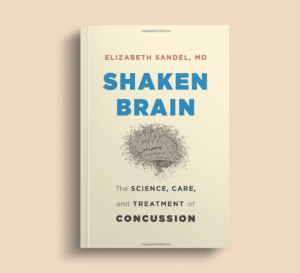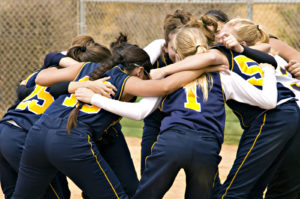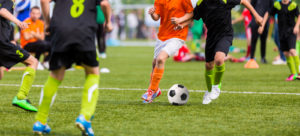A Parent’s Key Role after a Child’s Concussion

If your child has experienced a concussion from a youth sports injury, you surely want them to recover as quickly and as completely as possible. What can you do to make that happen?
Michelle Camicia, MSN, PhD, a rehabilitation nurse leader and Director of Operations for Kaiser Foundation Rehabilitation Center, was the invited expert for my most recent interview on youth sports concussions. She noted that while doctors are good about providing detailed treatment plans, which typically include restrictions on both physical and mental activity, they are not so good at giving advice to parents on how to implement those plans at home and at school. Getting children and teens to do what you say is hard enough, but combine that with a brain injury and it can be a real challenge.
Still, despite the lack of information and guidance in meeting that challenge, there are a couple specific things you can do.. (Note that the advice below is general and is not intended to be prescriptive, so make sure to follow the advice of the health care professionals working with you and your child.)
A smart idea for your child’s smartphone
One of the most important things to stick to during this recovery phase is the restriction on screen time. Looking at screens is very taxing to the brain, as it needs constant activity to keep up with the refresh rate, which (depending on technology) typically ranges from 60-600 Hz. The common recommendation is to limit total screen time to no more than 1-2 hours per day.
During recovery from a concussion, your child must limit exposure to all screens, including movie screens, TVs, computers, tablets, video gaming devices, and, worst of all, smartphones with the smallest screens. Kids live on their smartphones and may feel cut off from their friends and their life if they’re not constantly connected, so this is can be a battle waiting to happen. You may need to take control of these devices during the recovery period and only allow them limited access, maybe once per day, or several times throughout the day at least initially.
Let your kids know that by spending time on screens now, they may be lengthening the time before they can return to school and sports, as screen time can cause symptoms to worsen or not improve and may delay recovery after a brain injury. For many kids, this information may be enough to convince them to hand over their phones and tablets to you to manage.
Monitor sleep and physical activity
This is another tricky area because the brain needs time to rest, but at the same time, exercise of the right type and at the right time can help the brain recover and may reduce symptoms of concussion. Collision and contact sports should definitely be avoided until your doctor gives the all-clear, but gradually introducing other activities like walking and swimming (with your doctor’s okay) might be good choices for your child to pursue initially during recovery.As a counterpart to this, plenty of sleep is the other crucial component. Make sure your child is getting a full night’s sleep to let the brain recover. Your child may have an increased sleep requirement or a major change in sleep pattern and this should be discussed with your child’s
As a counterpart to this, plenty of sleep is the other crucial component. Make sure your child is getting a full night’s sleep to let the brain recover. Your child may have an increased sleep requirement or a major change in sleep pattern and this should be discussed with your child’s physician.
Ask your child’s teachers for support
Contact your child’s teachers to let them know what’s happening and ask for their understanding and support. Help them understand that unlike other situations where a child may be absent from school but is still able to complete make-up homework, recovering from a brain injury requires mental as well as physical rest.Your child’s teachers can continue to support recovery at school by making necessary adjustments. Ask for updates on your child’s progress as well
Your child’s teachers can continue to support recovery at school by making necessary adjustments. Ask for updates on your child’s progress as well as reports on any cognitive or behavioral problems in the classroom, and relay that information to your child’s doctor.
Recovery is a process
Recovery is sometimes a slow process, but you can help it along by making sure your child sticks to the recovery plan as closely as possible. Speak to your child’s physician or other healthcare provider about ways to help your child’s compliance. Remind your child that the sooner recovery occurs, the sooner they can return to all the activities they love.
The topic of youth sports concussion is big, and to hear more from the point of view of a healthcare professional and mom, watch the entire interview with Michelle Camicia, MSN, PhD.
You Might Also Like
Parents and Sports-Related Concussions
Michelle Camicia, MSN, PhD, the mother of two student athletes, discusses the role of parents who must pay attention to their childrens’ symptoms if they play contact sports. Are these symptoms consistently understood by student athletes and coaches? She argues for more education and advocacy to address the problem of…
Empowering Your Kids to Speak up About Concussions in Youth Sports
There are many reasons why kids do not report concussions. They must be educated about brain injuries, including concussions. They must be empowered to report to an adult any symptoms after a blow to the head, neck, or body that causes neurological symptoms (like dizziness, headache, or confusion). Removal from the sport or activity followed by evaluation by a licensed healthcare provider should be expedited.
Be a Parent Advocate for Children and Youth Sports Concussions
Parents must communicate with the school after their son or daughter has a concussion to make sure that there are accommodations if needed during recovery.
Keep up to date
Get updates on the latest in concussion, brain health, and science-related tools from Dr. Elizabeth Sandel, M.D.
By clicking SIGN UP, you agree to receive emails from Dr. Sandel and agree to our terms of use and privacy policy.
Get the book!




